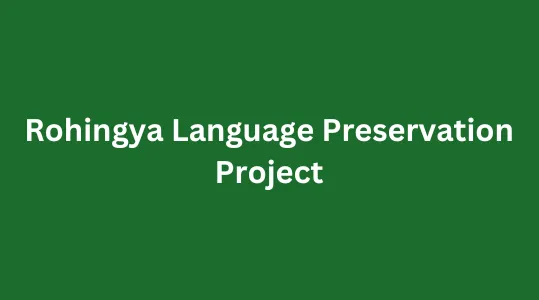Myanmar/Bangladesh: New Report Reveals Rohingya Loss of Language, Culture, and Identity
16 November 2022

New report exposes details of “cultural genocide” including loss of the Rohingya language and culture
(COX’S BAZAR, November 16, 2022)—Rohingya people in Bangladesh and Myanmar are experiencing severe loss of their culture and language amounting to “cultural genocide” says a new report published today by the Rohingya Language Preservation Project, a Cox’s Bazar-based Rohingya refugee research team.
The 54-page report, “‘First They Targeted Our Culture and Language:’ Threats to Rohingya Language, Culture, and Identity in Myanmar and Bangladesh,” is based on Rohingya-led, participatory research conducted between July and December 2021. The report provides new and important findings on how the Rohingya language plays a critical and central role in Rohingya cultural identity and cultural perseveration in Bangladesh and worldwide.
“The Myanmar state for decades has undertaken a ‘cultural genocide’ against the Rohingya including destroying our language and culture,” said Mayyu Ali lead author of the report and coordinator of the Rohingya Language Preservation Project. “The Rohingya people and governments worldwide should support the preservation of the Rohingya language and culture as a way of resisting the destruction of Rohingya identity.”
The report details how the Myanmar junta has not only used killing and violence, but also decades of cultural and linguistic repression, as it moves toward its aim of destroying the Rohingya people. The Government of Bangladesh is exacerbating this repression by banning Rohingya cultural events, restricting the activities of Rohingya civil society, closing Rohingya schools, and severely restricting freedom of movement for more than one million Rohingya refugees in Bangladesh.
Eradicating culture, banning religious practices and institutions, suppressing language, forbidding traditional ceremonies, and destroying cultural buildings are very often part of genocide.
“Cultural genocide” is a legal concept which was proposed by lawyer Raphael Lemkin in 1944 as a component of genocide but never made it into the 1949 Geneva Convention for several political reasons at the time. It is defined as the intentional destruction of a group’s heritage, objects, and practices with the purpose of destroying the unique cultural attributes of the group itself.
The Rohingya-led, participatory research which feeds into this new report was conceptualized, planned, and executed by a 23-member Rohingya research team, which conducted 285 interviews with 148 females and 137 males. These interviews included participants from all refugee camps in Bangladesh’s Cox’s Bazar and on Bhasan Char island with Rohingya Muslims, Hindus, and Christians.
When asked about language use, the vast majority of respondents (99%) reported that Rohingya was their native language, and 1% reported that “Burmese Bangla” was their native language. The report finds that most respondents (86%) used Rohingya mixed with Bangla and Chittagonian, while 14% use only Rohingya, in their daily life.
The researchers asked Rohingya what their “gravest concerns” in the Bangladesh refugee camps were. 17% of respondents said that “preservation of Rohingya culture and language” was one of their gravest concerns. Notably, language and cultural preservation was rated as important in higher numbers of respondents than other essential concerns such as education (15%), healthcare (12%), and food and shelter (6%). Considering this, it is unsurprising that 98% of the Rohingya respondents said that they felt they were currently losing their language in the refugee camps in Bangladesh.
The Rohingya research team also asked an open-ended follow-up question about how the perceived loss of the Rohingya language made participants feel. Some 38% expressed feeling sad, while 34% expressed being disappointed, hurt, or upset, 19% reported worry, anxiety, and fear, and 5% reported feeling anger and frustration.
The report also spotlights Rohingya views about the intersection of language, identity, and human rights with regard to a future return to Myanmar. 61% of interviewees thought that they would face more discrimination and conflict in Myanmar if their language changed, 21% thought these changes could be used to further deny Rohingya citizenship, and 12.3% thought they would be deported again by the Myanmar government because of changes to their language and culture.
Respondents also shared the perspective that the Myanmar junta’s false claims of Rohingya illegal immigration will appear more valid if Rohingya people assimilate to Bangla culture and language.
Finally, the Rohingya-led research team asked respondents in the refugee camps in Bangladesh if they thought it was important to have a permanent Rohingya culture and language preservation center. 90% of the respondents said that they thought this idea was “extremely” important, while 9% thought that it was “quite” important.
The report has more than 25 recommendations for the National Unity Government (NUG) of Myanmar, Bangladesh government, international community, and Rohingya themselves. It calls on the NUG to restore Rohingya citizenship immediately, and recognize “Rohingya” as an official ethnicity as well as construct and support a Rohingya National Museum for permanent preservation of Rohingya culture and language in Myanmar.
The report also calls on the Government of Bangladesh to end restrictions on cultural events, freedom of movement, education, and employment for Rohingya refugees.
“Rohingya need support more than ever and this includes in preserving culture and language,” said Mayyu Ali lead author and coordinator of the Rohingya Language Preservation Project.
For more information, please contact:
Mayyu Ali, coordinator of the Rohingya Language Preservation Project
Email: [email protected]
+1(613) 717-1002 (English; Rohingya; Burmese) Twitter: @AliMayyu
Andrew Riley, international advisor to the Rohingya Language Preservation Project
Email: [email protected]
+34 605 38 87 33 (English)
Twitter: @andrewkyleriley
Announcements
28 February 2025
Asian NGO Network on National Human Rights Institutions , CSO Working Group on Independent National Human Rights Institution (Burma/Myanmar)
Open letter: Removal of the membership of the dis-accredited Myanmar National Human Rights Commission from the Southeast Asia National Human Rights Institution Forum

Progressive Voice is a participatory rights-based policy research and advocacy organization rooted in civil society, that maintains strong networks and relationships with grassroots organizations and community-based organizations throughout Myanmar. It acts as a bridge to the international community and international policymakers by amplifying voices from the ground, and advocating for a rights-based policy narrative.